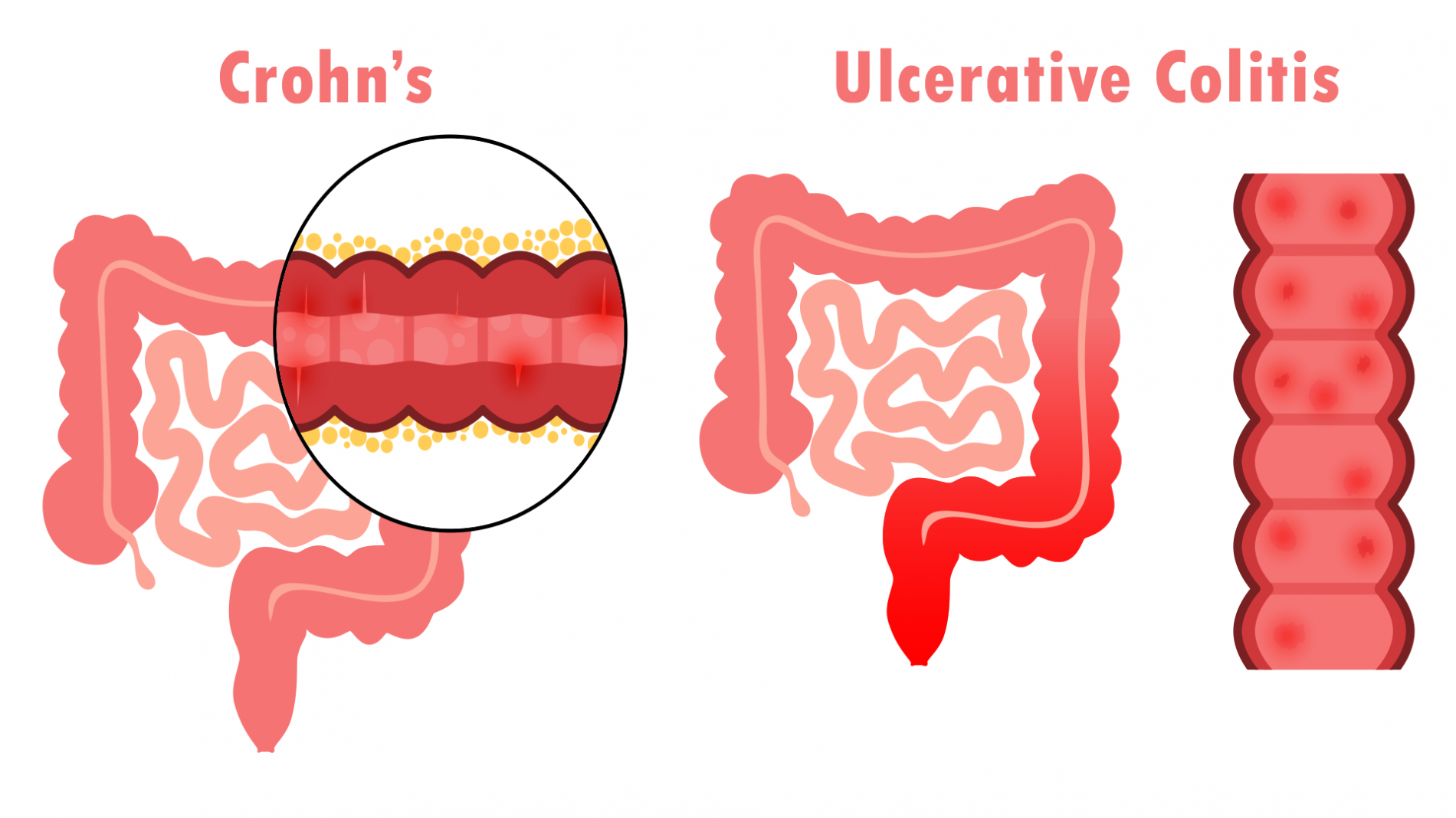Crohn's and Ulcerative Colitis

Although Crohn’s disease and ulcerative colitis share similarities, they have a few major differences. Both are inflammatory bowel diseases (IBD) and are felt to be autoimmune diseases (where the body’s own immune system attacks the intestines). Crohn’s disease and ulcerative colitis are relatively common. In fact, the Centers for Disease Control reported in 2015 that up to 1.3% of US adults have been diagnosed with IBD, which means there are about 4 million adults with IBD in the US! Chances are if you are not familiar with these conditions from personal experience, you at least know someone who is.
Similarities and Differences
Either Crohn’s disease or ulcerative colitis will typically result in diarrhea, which is often bloody and may also include pus. Patients with either Crohn’s disease or ulcerative colitis may also have abdominal pain, urgency when needing to go to the toilet, a sense of incomplete bowel movements, and rectal pain. Fevers, nutritional problems, and weight loss may occur with both conditions. After several years, there is an increased risk of colon cancer with colitis from either condition.
Obstruction or blockage of the bowel may occur with Crohn’s disease, as may abnormal connections between the bowel and other parts of the body called fistulas. These are not seen in ulcerative colitis. Another difference is that in ulcerative colitis the inflammation is limited to the innermost layer of the colon, but in Crohn’s disease, the entire thickness of the wall of the bowel may be involved. Crohn’s disease may skip areas of the gut, leaving them uninvolved, but with ulcerative colitis the involved area is uninterrupted. Finally, ulcerative colitis only involves the large intestine (colon and rectum). On the other hand, Crohn’s disease may involve any part of the digestive system from the mouth to the anus.

Types of Crohn’s
- Ileocolitis - Inflammation at the end of the small intestine and part of the large intestine
- Ileitis - Inflammation of the last part of the small intestine.
- Gastroduodenal Crohn’s - Inflammation of the stomach and first portion of the small bowel.
- Jejunoileitis - Inflammation of the second and third parts of the small intestine.
- Crohn’s (Granulomatous) - Inflammation of part of the colon only.
Types of Ulcerative Colitis
- Ulcerative Proctitis - Inflammation of the rectum only.
- Left-Sided Colitis - Inflammation from the rectum to somewhere on the left side of the colon, but not past the splenic flexure (a fold in the colon near the spleen).
- Extensive Colitis (Pancolitis) - Inflammation of the entire colon
- Proctosigmoiditis- A specific form of left-sided ulcerative colitis, where the rectum and sigmoid colon are involved.
- Pancolitis - Inflammation of the entire colon.
Causes
While ulcerative colitis and Crohn’s disease were once thought to be caused by stress, experts now know this not to be the case. However, stress may often worsen symptoms of IBD even though it is not the underlying cause.
Recent studies suggest that genetics (hereditary factors) and environment both play roles.

Treatment
There is no cure for either Crohn’s disease or ulcerative colitis, but they can be managed. Medications decrease inflammation and improve quality of life. Having symptoms under control is important also to prevent damage and complications (things that can go wrong). Often this will require long-term treatment with medication. Some patients require dietary changes, and surgery is sometimes necessary.
Crohn's disease and ulcerative colitis are both forms of inflammatory bowel disease (IBD) and while each has its own unique features, there are many similarities. While the initial diagnosis of IBD is often in a patient's teens or twenties, this is not always the case.
If you have ongoing symptoms such as diarrhea and abdominal pain, it is worth considering the possibility of IBD. Please contact us to schedule an appointment. We want to help you maintain your good gut health!

Last Modified:


